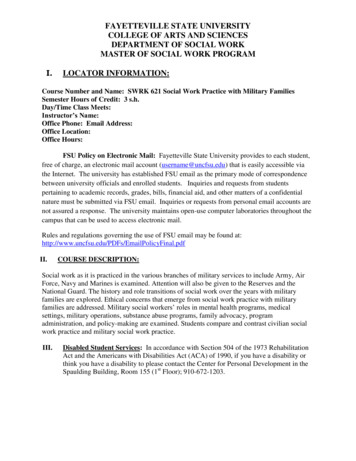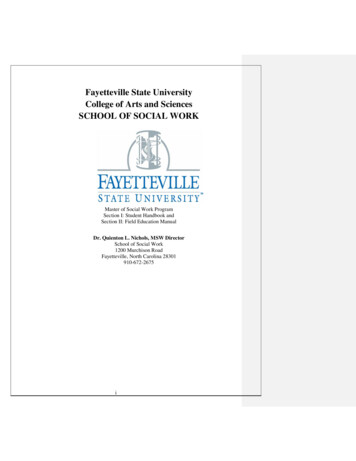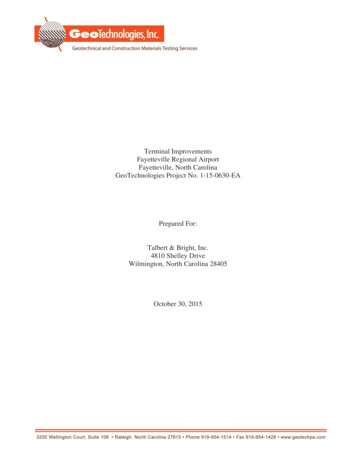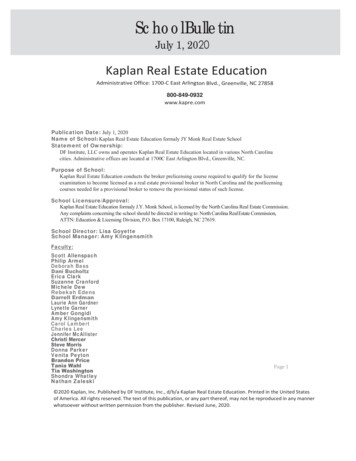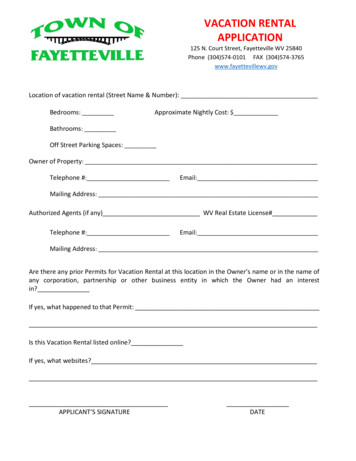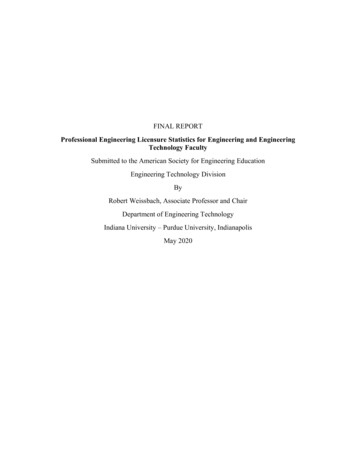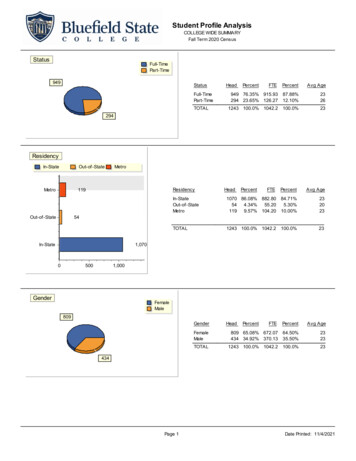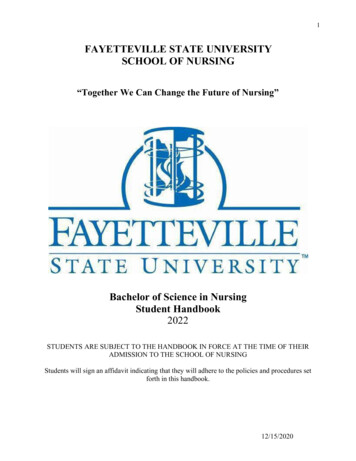
Transcription
1FAYETTEVILLE STATE UNIVERSITYSCHOOL OF NURSING“Together We Can Change the Future of Nursing”Bachelor of Science in NursingStudent Handbook2022STUDENTS ARE SUBJECT TO THE HANDBOOK IN FORCE AT THE TIME OF THEIRADMISSION TO THE SCHOOL OF NURSINGStudents will sign an affidavit indicating that they will adhere to the policies and procedures setforth in this handbook.12/15/2020
2The School of Nursing follows the policies of Fayetteville State University as set forth in theUndergraduate Catalog. This handbook contains the policies and procedures that are specific tothe School of Nursing at Fayetteville State University. The student is responsible for reading,reviewing and adhering to the policies in this handbook, the Fayetteville State University StudentHandbook, the Website www.uncfsu.edu, and the Fayetteville State University UndergraduateCatalog.This handbook is subject to change based on meeting the requirements of regulatory agencies.The handbook will be maintained on the School of Nursing website. All changes will be updatedelectronically, and students will be notified of changes via their Bronco email account.12/15/2020
3TABLE OF CONTENTSIntroductionContact InformationSchool of Nursing Degree ProgramsInstitutional & Professional Licensure ceptual Framework and PhilosophyEducational Program GoalsEducational Program OutcomesRequired CoursesGeneral InformationChange of AddressTransportationConfidentialityHIPAA ComplianceAcademic Advisors and Faculty MentorsStudent Access to InstructorsTelephone CallsStudent Professional BehaviorsAcademic PoliciesGrading SystemAcademic Standards for ProgressionRe-Entry StudentsNursing Course Transfer PolicyNursing Advancement Placement CreditGrade Appeal PolicyTimeline for Formal Grade Appeal ProcessGraduation PolicyClinical/Lab PoliciesClinical ExperienceClinical AttendanceConsequences for Failing to Meet Clinical AttendanceSkills LabLiability InsuranceImmunizationsCardiopulmonary ResuscitationUniform and Dress CodePrimary Clinical Sites/Simulation Clinical UniformDress CodeCriminal Background CheckDrug ScreenSocial Media PolicyHandbook 15161616171717171717181819202123Attachment I – Learning Assessment and Support Program PolicyAttachment II – Professional Licensure for Students12/15/2020
4Welcome to the nursing program at Fayetteville State University.Our journey in achieving nursing excellence began in 1992 with our RN to BSN program. Thisvibrant program has thrived through-out our history to meet the needs of Registered Nurses inthis region and beyond. We continue to educate a large number of nurse leaders who play asignificant role in the health maintenance of citizens in North Carolina and the rest of thecountry. Our pre-licensure program boasts amazing graduates who continue to impact healthoutcomes of citizens in the communities they work in and beyond.Our guiding philosophy of Caring is palpable in all we do, and is an expectation of our faculty,staff, students and graduates.We are located in the state-of-the-art Southeastern North Carolina Nursing Education andResearch Center which is technologically enhanced to support nursing education of the 21stcentury as well as the Clinical Simulation Center where you will experience the best in humanpatient simulation.Best Wishes,Afua O. Arhin, RN, PhD Professor and Dean, Lloyd College of Health, Science and Technology12/15/2020
5Dear Students,I am excited to welcome you to the Fayetteville State University School of Nursing and the baccalaureatenursing program. You have made a great choice in your nursing career in choosing our BSN program. Asyou embark on this journey, you will recognize that you have vast career opportunities in nursing. You willlearn all the essentials in baccalaureate nursing educations to become a dynamic member of the health careteam. Nurses play a vital role in improving patient care safety and quality in all segments of the healthcaresystem by understanding proven techniques and interventions that will enhance patient outcomes.Our School of Nursing has a proven track record for success, and many of our graduates are doing greatthings in all facets of healthcare. You will be a part of an exceptionally talented student body recognized forits academic abilities, energy, and creativity, and we are pleased that you chose FSU.I encourage you to take advantage of every opportunity we give you to learn, enhance your success, andfurther develop your career. Also, we have the most dedicated faculty, administrative team, and support staffthat is extremely devoted to your success. I encourage you to reach out to these individuals at times whenyou might need assistance.Thank you again for choosing FSU. I wish you tremendous success this year and beyond and look forwardto seeing the countless and diverse contributions each of you will add globally and to our FSU community.Sheila Cannon, Ph.D., PMHCNS, PMHNP, BC, RNAssociate Professor, Associate Dean School of Nursing12/15/2020
6CONTACT INFORMATIONFayetteville State University School of NursingNameDr. SheilaCannonTitleProfessor, InterimAssociate DeanLecturer/StudentCoordinatorMs. JacintaWilliamsMs. Lisa Scurry Academic AdvisorMs. BridgettElliottAcademic AdvisorE-mailNursing Phone (910)Bld.Scannon3@uncfsu.edu108 ontact information for faculty and staff members is available ol-of-nursing/faculty-and-staffContact information for the North Carolina Board of Nursing is available athttps://www.ncbon.com/Contact information for the Commission on Collegiate Nursing Education is available L OF NURSING DEGREE PROGRAMSGeneric (Pre-Licensure) Bachelor of Science (BSN) in Nursing CurriculumThe nursing curriculum is composed of two components: pre-nursing and upper division nursing.The pre-nursing component is composed of three academic semesters and one summer semesterof prerequisite courses or the equivalent. The upper division comprises four academic semestersone summer session after admission to the upper division:http://acalog.uncfsu.edu/preview program.php?catoid 5&poid 742&returnto 101INSTITUTIONAL AND PROFESSIONAL LICENSURE DISCLOSURES FORENROLLED AND PROSPECTIVE STUDENTSFSU's prelicensure degree program satisfies the professional licensure and certificationrequirements in North Carolina and prepares students to sit for these exams. However, provisionsin other states may be different.If you are considering a degree program that may or potentially lead to a professional license andcertification, please note that FSU may or may not be able to advise whether a program meetsrequirements outside of North Carolina. Before enrolling in a degree program, please discuss thisimportant topic with the Associate Dean at 910-672-1105 (See Attachment 2).12/15/2020
7RN to BSN Completion ProgramThis program is designed for Registered Nurses seeking a Bachelor of Science degree inNursing.http://acalog.uncfsu.edu/preview program.php?catoid 5&poid 686&returnto 101ACCREDITATION/APPROVALThe Generic (Pre-Licensure) BSN program is approved by the North Carolina Board ofNursing and both programs are accredited by the Commission on Collegiate NursingEducation (CCNE). The North Carolina Board of Nursing approves pre-licensureprograms.MISSIONConsistent with the mission of the university, the mission of the School of Nursing atFayetteville State University is to educate culturally competent, ethical, and caring nurses for aglobal society. Nursing is a discipline that builds on knowledge from nursing theory; the natural,social, and applied sciences; and the humanities. The School of Nursing is committed toeducating graduates who will provide evidence-based and patient-centered care. The facultyvalue the systematic and purposeful application of the nursing process to promote the optimalhealth of clients throughout the life cycle and in a variety of settings. The School of Nursingstrives to produce graduates who appreciate lifelong learning and are contributing members tothe profession of nursing, the community, and society.PURPOSEThe purpose of the BSN program at Fayetteville State University is to develop professionalnurses who are committed and are able to make sound clinical decisions in providing highquality healthcare to diverse populations in a variety of healthcare settings while meeting themarket demands. Upon completion of the program, FSU graduates will possess knowledge,attitudes, values, psychomotor skills and behaviors that define professional nursing. Graduateswill also possess the knowledge base appropriate for future graduate study.CONCEPTUAL FRAMEWORK AND PHILOSPOHYThe faculty of the School of Nursing decided on Jean Watson’s theory of Caring as theconceptual framework that guides the program. The faculty, consistent with Jean Watson’stheory, believes that for nurses to develop humanistic philosophies and value system, a strongliberal arts background is necessary, as demonstrated in our curriculum. The faculty also believein Jean Watson’s seven assumptions about the science of caring. These assumptions suggest that: Caring consists of carative factors that result in the satisfaction of certain humanneeds.Caring can be effectively demonstrated and practiced only interpersonally.Effective caring promotes health and individual or family growth.Caring responses accept the person not only as he or she is now but as what he or shemay become.A caring environment is one that offers the development of potential while allowingtheperson to choose the best action for himself or herself at a given point in time.Caring is more “healthogenic” than is curing. A science of caring is complementary to12/15/2020
8the science of curing.The practice of caring is central to nursing.The faculty members believe that a humanistic value system undergirds the construction of thescience of caring in nursing. The faculty members also believe in the application of Watson’sprimary carative factors in nursing education which include the following: The formation of a humanistic-altruistic system of values.The installation of faith-hope.The cultivation of sensitivity to one’s self and to others.The development of a helping-trust relationship. The promotion and acceptance of the expression of both positive and negative feelings.The systematic use of the scientific problem-solving method for decision making.The promotion of interpersonal teaching-learning.The provision for a supportive, protective and /or corrective mental, physical, sociocultural and spiritual environment.Assistance with the gratification of human needs.The allowance for existential-phenomenological forces. Consistent with the theory, the School of Nursing employs the systematic use of the scientificproblem-solving method for decision making. According to Watson, the scientific problemsolving method is the only method that allows for control and prediction, and that permits selfcorrection. She also values the relative nature of nursing and supports the need to examine anddevelop the other methods of knowing to provide a holistic perspective.The caring philosophy also encompasses the promotion of interpersonal teaching-learning. In thecontext of nursing education, the caring nurse, and nurse educator, must focus on the learningprocess as much as the teaching process. Provision for a supportive, protective and /or correctivemental, physical, socio-cultural and spiritual environment is also essential to this theory.This philosophy and value system provide a solid foundation for the approach to nursingeducation at Fayetteville State University as well as providing a foundation in extending ourexpertise and caring to a wide range of communities in the future.EDUCATIONAL PROGRAM GOALSThe overall goals of the nursing program are: Maintain full approval from the North Carolina Board of Nursing. Maintain continuing accreditation by the Commission on Collegiate NursingEducation(CCNE). Maintain first time pass rate on the NCLEX-RN within at least 95% of the nationalaverage pass rate. Graduate no less than 75% of students entering the program. Recruit, enroll, retain and graduate a more diverse workforce for nursing. Emphasize the development of skill sets of our graduates to contribute to the reductionofhealth disparities currently experienced by citizens of North Carolina. Supply military stakeholders with sufficient professional nurses to meet healthdemands,and expand the capacity to provide high quality, accessible, educational programs to12/15/2020
9those students seeking baccalaureate degrees in nursing.EDUCATIONAL PROGRAM OUTCOMESThe educational program outcomes for nursing program are consistent with the mission ofFayetteville State University, the standards of the Commission on Collegiate Nursing Education(CCNE) and the North Carolina Board of Nursing and are as follows: Synthesize empirical and theoretical knowledge from nursing, the natural, social andapplied sciences, and the humanities to achieve optimal health care outcomes forclientsthroughout the lifecycle in a variety of settings. Demonstrate competency in the utilization of systematic and purposeful application ofthe nursing process to promote the optimal health of clients throughout the life cycle in avariety of settings.Collaborate with interdisciplinary teams to provide culturally competent, patient centeredcare to clients throughout the lifecycle.Utilize the principles of economics and social justices to enhance accessibilitytohealthcare and thereby decreasing health disparities.Utilize critical thinking and ethical decision making to enhance quality improvement inthe outcomes of patient care and the health care needs of the community.Integrate informatics and technological advancement into the delivery of nursingpractice.Utilize knowledge and leadership skills to manage systems that are responsive to thehealth care needs of southeastern North Carolina, the state, the nation and the globalsociety.Apply research findings to support evidence-based best practices in the delivery ofnursing interventions to improve health care of a diverse population. REQUIRED COURSESComplete nursing program information (course descriptions and curriculum plans) can beviewed by clicking on the following to%20BSN.pdfhttp://acalog.uncfsu.edu/preview program.php?catoid 5&poid 686&returnto 101http://acalog.uncfsu.edu/preview program.php?catoid 5&poid 742&returnto 101GENERAL INFORMATIONChange of Name, Address, and/or Telephone NumberIf there is a change in the name, address, and/or telephone number of a student while enrolled inthe Nursing Program, the student must report the change to the School of Nursing. Please keepan updated emergency phone number with the School of Nursing office.12/15/2020
10TransportationTransportation to and from all classes and clinical learning experiences is the responsibility ofeach individual student. Faculty does realize the importance of carpooling, but it is not alwayspossible for clinical rotations.ConfidentialityConfidentiality is a component of accountability and must be observed at all times.Discussions,written information, and medical record pictures concerning client(s) must be limitedto pre-and post-conferences and nursing theory classes. At no time shall a client be discussed whileat break, on the elevator, in the dining area, on campus, at home, or any other similar setting.Confidentiality cannot be over-emphasized. Noncompliance is cause for dismissal from theprogram.HIPAA ComplianceAll those in healthcare must now comply with the federal regulations of The AdministrationSimplification Subtitle of the Health Insurance Portability & Accountability Act of 1996(HIPAA). This Act requires that individually identifiable patient information be disclosed on aneed-to-know basis only. Care must be taken to minimize incidental disclosures and mustdisclose only minimal amounts of information necessary to accomplish the task. The minimumdisclosure standard, however, does not apply to requests for information by a healthcare providerfor treatment purposes. For example, when administering a medication, the healthcare providerwould have full access to the medical record. This is covered by the patient’s consent fortreatment.In order to protect patient/client privacy, all information that could identify thepatient/client must be removed from student papers, such as care plans and case studies.Information to be removed includes the individual’s name, initials, address, phone number, faxnumber and Social Security number. Student papers may not be copied for careless circulationand handling. Written documents containing private health information must be either carefullystored or shredded to prevent the circulation of confidential patient information.Confidentiality and privacy also extend to oral communications which extend beyond the need toknow for treatment and/or educational purposes.Clinical agencies are also mandated to follow HIPAA regulations. Students will therefore berequired to meet any and all of the clinical agency’s requirements as part of the clinicalaffiliation.Academic Advisors and Faculty MentorsEach student is assigned a professional academic advisor who will assist the student with classscheduling and program progression related issues. Each student will select a faculty mentorduring the first semester of upper division nursing courses. The faculty mentor will serve as anadditional resource for the student and is available during office hours or by special request.Student Access to Instructors12/15/2020
11Full-time faculty members will post office hours to inform students of their availability forinteraction and academic assistance. Part-time faculty members will notify students of theiravailability outside of class and clinical.Telephone CallsNo telephone calls are to be received in the clinical area except in the case of an emergency.Out-going personal calls of an emergency nature may be made from the clinical area only aftersecuring permission from the clinical instructor. Students must keep their cell phones, pagers,and any other personal communication devices off and is prohibited in the patient care areas.Taking pictures, recordings, etc., of a patient or patient information or posting pictures,recordings, etc., on the internet, through email, or other electronic mediums by cell phone orother personal communication devices without the patient’s prior written consent or inviolation of the clinical agency’s policy may be a violation of HIPAA. Failure to adhere to thispolicy may subject the student to disciplinary action which may include suspension, dismissaland/or legal action by the clinical agency or patient.Student Professional BehaviorsStudents are expected to adhere to the University’s Code of Conduct located 0of%20Legal%20Affairs/CodeofStudentConduct2017.pdf , the Code of Ethics for Nurses located at g-excellence/ethics/ and the following professional behaviors:1. Demonstrate professional responsibility and accountability in providing nursing care by:a. Showing self-direction in providing care of client(s).b. Reporting promptly to the clinical area.c. Leaving assigned experience area by reporting off duty appropriately.d. Identifying own assets and limitations with instructor.e. Accepting and utilizing constructive feedback and suggestions.f. Submitting assignments punctually.2. Complete responsibility for assigned client(s) prior to post conferencesby:a. Completing charting and reporting is completed by designatedtime.b. Terminating client relationship prior to leaving each day.c. Organizing care to utilize time effectively.d. Leaving work area neat, clean, and resupplied.3. Inform instructor at appropriate intervals during clinical by:a. Assuming responsibility for assignments.b. Reporting pertinent observations promptly.c. Participating in learning situations.d. Accepting responsibility for own errors and actions.e. Calling attention to own errors which the instructor or staff may not notice.4. Students provide quality care to all clients by:a. Reporting immediately to the clinical instructor and charge nurse all personalinjuries.12/15/2020
b. Following clinical facility policy for alleged injuries.c. Reporting immediately to the clinical instructor any ethical dilemma orconflicts that arise during provision of care.5. Assume responsibility for meeting personal and professional behaviors by:a. Accepting professional responsibility by practicing courteous, cooperative,pleasant, and helpful interaction with others (this includes verbal andnonverbal communication).b.c.d.e.f.Accepting personal responsibility for one’s own actions.Utilizing moral, ethical, professional, and legal principles.Representing Fayetteville State University in a professional manner at all times.Wearing professional attire essential to maintain a professional image.Recognizing performance strengths and limitations and accepting responsibilityfor proactively implementing a remediation plan of action.ACADEMIC POLICIESGrading SystemThe grading scale for the School of Nursing is as follows:A – 93 -100B – 85 – 92C – 78 – 84D – 70 – 77F – 69 and belowAcademic Standards for Progression1. All NURS courses will be evaluated based on satisfactory completion of allcomponents (class and/or laboratory/clinical/practicum). The classroom competencystandard requirement is 78% (C). Students are required to achieve satisfactoryevaluation in the laboratory/clinical/practicum components. For those NURS coursesthat only have a practicum component standard requirement is 78% (C). Numericalgrades below 78% (C) in the NURS courses and/or an unsatisfactorylaboratory/clinical/practicum evaluation for the semester are consideredunsatisfactory attainment of course competencies. Students must satisfactorilycomplete all components of the course in order to progress in the program. A failure(unsatisfactory) of the laboratory/clinical/practicum component will result in acoursegrade of “F” for unsatisfactory attainment of course requirements. The grade thestudent receives in the didactic component of the course will be the recorded gradefor the course.2. Students must earn a grade of “C” or higher in each non-NURS and NURS course inorder to progress in the nursing program.3. Students who do not score a minimum of 78% competency on each unit test in pre12/15/202012
licensure NURS courses, are required to meet with the instructor following the test,and complete remediation. Remediation must be completed as assigned by theinstructor or progression in the course will be denied. Documentation will bemaintained by faculty on completed assignments. Students are encouraged to meetwith a counselor in student services unless it has been determined by faculty to be arequirement for remediation. Students must also meet with their academic advisor ifplaced on academic probation.4. A nursing course may only be repeated one time.5. A course final grade of a “D” and/or “F” in any two nursing courses will result in anautomatic dismissal from the nursing program. Students should be aware that re-entryinto a course is based on space available.6. Pre-licensure nursing students will be required to take a number of standardized teststhroughout the nursing program to monitor the student’s retention of course content.The scores from these tests may be used as part of the course grade. Students withstandardized test scores less than the norm/standard score as defined by the testingservice, will be required to complete remediation. (See NURS Course Syllabus forspecific procedural details and Attachment I that explains the Learning Assessmentand Support Program Policy).7. All written assignments/activities for class, lab or clinical/practicum must besatisfactorily completed. Failure to satisfactorily complete assignments/activities bythe specified time period as identified in the NURS course syllabus/LearningManagement System will result in a meeting with nursing faculty to determine causeand program progression. A pattern of noncompliance will result in a course grade of“F.’’8. A medication dosage calculation test will be administered in each pre-licensureNURS clinical course. Students must achieve a 90% score on the medication dosagecalculation test. Three attempts to achieve this required score will beprovided. Remediation will be provided after the first and second unsatisfactoryattempt. Failure to achieve a 90% score after an unsuccessful third attempt will resultin a course grade of "F" for unsatisfactory attainment of course requirements. (SeeNURS Course Syllabi for specific procedural details.)9. Pre-licensure nursing students must adhere to the curriculum sequenced plan forprogression. A student may take non-nursing courses in advance but cannot take themlate as the course may become pre-requisite or co-requisite to the next NURS course.Students who do not receive a satisfactory grade in the required pre-requisite or corequisite courses within the curriculum sequence will not be able to progress in thenursing program. (See NURS Course Syllabus for specific requirements)10. Maintain current American Heart Association Cardiopulmonary Resuscitation (CPR)certification; all immunization and vaccination requirements; liability and healthinsurance while enrolled in the nursing program.11. Adhere to all policies of the university, nursing program, and clinical agencies.12/15/202013
1412. Maintain an unrestricted, current RN license. (RN-BSN students only.)Re-Entry StudentsStudents unable to progress in the Nursing program course sequence may re-apply to the nursingprogram one time. The student desiring to reapply to the program must do so within one year andwill be re-evaluated for program placement based on individual circumstances and programrequirements.Acceptance is contingent upon the following:1. Meeting the current admission and graduation requirements in effect at the time ofreapplication.2. Admission testing for re-entry students are only required for first semester NURScourses.3. Availability of space.Final approval for re-entry has to be granted by the associate dean of the School of Nursingfollowing a thorough review of the student’s record by the nursing faculty. The associate dean ofthe School of Nursing will communicate the faculty’s decision to the Admission, Progression,Retention, and Policy Committee.If a grade of incomplete (I) is assigned in any nursing course, the student must follow thecompletion plan outlined by the School of Nursing administration and faculty of each course. Thestudent must also follow the policy of the university in removing incomplete grades. All finalplans for removing incomplete grades must be approved by the Associate Dean of the School ofNursing or designee.Nursing Course Transfer PolicyTransfer credit will not be awarded for required NURS courses.Nursing Course Advancement Placement Credit PolicyCredit by exam or advancement placement credit will not be awarded for required NURS coursesGrade Appeal PolicyGrade appeals will follow the university’s grade appeal policies and procedures which can beaccessed at eals and described as follows:A student may appeal a final grade if she or he thinks the grade is inaccurate. The student mustfirst consult with the faculty member who awarded the grade. The university expects themajority of grade appeals to be resolved by the student and instructor. If the faculty memberupholds the appeal, they will process a grade change form in accordance with the universities’policies and procedures. If the faculty member does not approve the appeal the student mayinitiate a formal grade appeal.12/15/2020
15The formal grade appeal submitted by the student must include documentation that one or moreof the following occurred: 1) the instructor made an error in calculating the final grade; 2) thefinal grade was based on criteria and/or standards at variance with the course syllabus; and/or 3)the final grade was based on factors other than student achievement/performance. Students mustrecognize that they bear the burden of proof in the grade appeal process and that it is veryunlikely that an appeal will be successful without appropriate documentation. The student mustsubmit the written appeal to the faculty member’s associate dean and dean, and finally theprovost and vice chancellor for Academic Affairs. The grade appeal will be considered at eachadministrative level only after it has been reviewed by the faculty member and at each previousadministrative level. The associate dean and dean of the College of Arts and Sciences willrespond to the grade appeal either by upholding the original grade or working with the facultymember (and, in the case of the dean, with the associate dean) to propose a means of reevaluating the student’s final grade. The associate dean and dean do not have the authority tochange a student’s grade. If the student’s concerns are not resolved by the associate dean anddean, the student may submit the written appeal to the provost and vice chancellor for AcademicAppeals, who will forward the appeal to the Academic Credits Committee, which is comprisedexclusively of faculty members. The Academic Credits Committee will recommend that theoriginal grade be upheld or will recommend a new grade. If the committee upholds the originalgrade, the studen
Consistent with the mission of the university, the mission of the School of Nursing at Fayetteville State University is to educate culturally competent, ethical, and caring nurses for a global society. Nursing is a discipline that builds on knowledge from nursing theory; the natural, social, and applied sciences; and the humanities.

